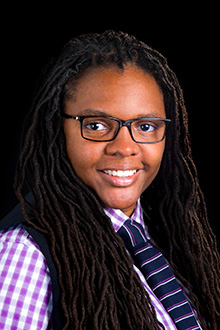
By examining New York City vital records, Emory sociologist Alyasah Ali Sewell found a greater risk of high blood pressure and obesity for all neighborhood residents where lethal police violence occurred, and a greater risk of obesity for women.
As a series of police shootings sparked protests and a national reckoning on race this summer, Emory sociologist Alyasah Ali Sewell published a paper on the consequences that police violence has on the health of residents in neighborhoods where it occurs.
Previous research has repeatedly shown aggressive policing exacts a mental toll on men. By examining a decade’s worth of New York City vital records, Sewell and sociologists from the University of Maryland found a greater risk of high blood pressure and obesity for all neighborhood residents where lethal police violence occurred, and a greater risk of obesity for women.
And the women residents faced a 30 to 54 percent greater risk of diabetes, high blood pressure and obesity compared to men.
The findings in the paper, published in July in the journal Ethnic and Racial Studies, held even when the women had no discernible connection to the victims of police shootings. The research also shows that neighborhoods where civilians have been killed by police tend to be majority Black or Latino.
“That’s the CVD trifecta,” Sewell says of conditions that increase the risk of cardiovascular disease (CVD) and also are associated with elevated risk for the most severe form of COVID-19.
“There shouldn’t be a relationship to police violence and health conditions, but there is,” Sewell adds. “When things are connected that otherwise shouldn’t be, it shows how systemic racism works.”
Sewell has incorporated the findings, which demonstrate the impact of police violence in ways not previously considered, into courses they are teaching on health disparities and ethnoracial inequality this fall.
“I think of this research as an important part of a conversation we need to have, about how we are training our police and how that is affecting people on an intimate level,” Sewell says. “We can show these legacies of violence can continue to shape those neighborhoods, regardless of race but especially in women.”
Junior Liz Pittenger, a sociology and psychology double major, had already taken courses on ethnoracial policies and inequality with Sewell but made sure to read up on the new paper this summer.
She immediately saw ways the findings would add to current conversations and to her work as a research assistant with the Justice and Involvement Coalition, a multidisciplinary group of Emory scholars focused on equity and justice.
“You can’t talk about police brutality or COVID-19 without addressing the inequity,” Pittenger says. “Both show the stress of being in a marginalized community, and it’s very important to have a person-forward way of thinking about that. This isn’t just data. This is real people.”
Consider Erica Garner. She was 23 when New York City Police put her father, Eric, in a prohibited chokehold while arresting him for allegedly selling untaxed cigarettes.
Bystanders captured Eric Garner’s death and his repeated gasps of “I can’t breathe.”
As her father’s last words became a rallying cry against police brutality, Erica Garner became an activist for the first time, while also working through her own grief, anxiety and anger at the loss of her father.
Erica Garner was 27 when she died of a heart attack, which her family attributed to the stress.
“You see this pattern of Black women dying of the diseases of old age, like heart attacks, in their 20s and 30s because women are carrying this burden literally in their blood,” Sewell says.
For Sewell, the research is the “scaffolding” for Emory students destined to be the leaders in their communities, whether by career or by simply speaking out, making the hard decisions about how to do better.
Senior Whitney Forbis, who works on Sewell’s Race and Policing Project, finds the research adds an organizational context to how police brutality occurs. That broadens the foundation Forbis, a double major in sociology and creative writing, needs for a planned career as an attorney specializing in capital cases.
“When you look back at the big Supreme Court cases on the death penalty, they all start with a statistical sociological study like this,” Forbis says. “If you learn to analyze this research, you carry with you a deeper understanding of how things operate. That is essential if you want to create change.”
